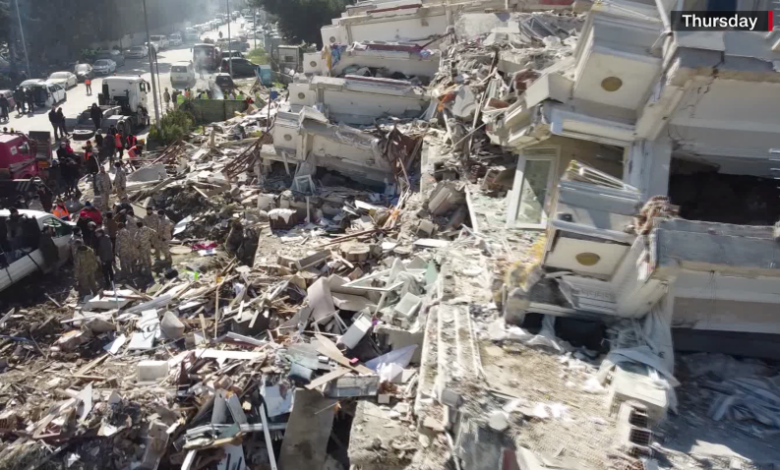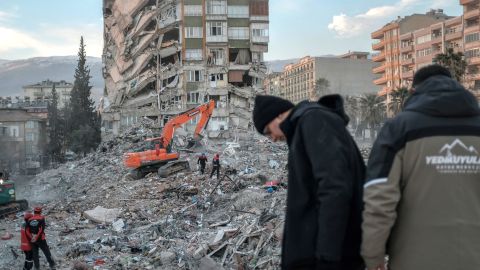
While people were begging the government for shelters to sleep in during the freezing weather in the immediate aftermath of the quake, the Turkish Red Crescent sold 2,050 tents to the AHBAP charity organization for 46 million Turkish liras (around $2.4 million dollars), both groups have said.
AHBAP, a well-known charity in the country, said it was desperate to acquire tents and couldn’t find any to deliver to people in need, so made a decision to purchase from the Red Crescent, which is known in Turkey as Kizilay.
“Our friends had a meeting with Kızılay Çadır ve Tekstil A.Ş, which is a subsidiary of Kızılay. We immediately signed the contract for the tents that we learned had 2,050 tents in hand, and the next morning we sent 2,050 tents to the earthquake zone,” AHBAP wrote in a tweet.
“Since the earthquake affected 10 provinces and the destruction was at an extraordinary level, the existing stocks of all tent manufacturers in our country could not meet the grievances of our citizens. The companies we contacted at that time did not have tents that we could send to the earthquake zone that morning. They were able to make them within a week at the earliest,” AHBAP added.
President of The Red Crescent, Kerem Kınık, told CNN’s sister network CNN Turk Monday that he was not aware of the sale, adding that it was the decision of his staff to sell the tents. He said if he was aware of the situation, he would have suggested giving them away.

However, a day earlier, on Sunday, Kınık wrote in a tweet, “@Ahbap and @Red Crescent’s cooperation is moral, rational, and legal. Anyone who claims otherwise either does not understand the issue or is malicious.”
Haluk Levent, a singer who founded AHBAP, wrote in a tweet Monday that his charity not only bought tents but also purchased “30 thousand units of food from Kızılay Lojistik A.Ş., which each one would supply 3 meals for a family of 4 and does not expire for a year.”
“In total, we purchased 108 million Turkish Liras worth of food from five different suppliers. 14 million of this (around $742,000) we bought from Kızılay Lojistik A.Ş.,” Levent also wrote.
Kınık also wrote on his Twitter account on Monday: “PUBLIC DISCLOSURE. The Red Crescent Society delivers the donations it receives to those in need, it certainly does NOT sell it. The subject in the press is the activities of our companies specialized in the field of humanitarian aid, which generates sustainable income for the Red Crescent.”
The revelations have attracted criticism in Turkey. Ahmet Davutoglu, who was formerly prime minister under Turkish President Recep Tayyip Erdogan’s AK Party, criticized the Red Crescent on Twitter, writing: “Red Crescent cannot sell tents while people are desperately waiting for tents on the street. Those tents should have been delivered to the people of the region free of charge. It’s called ignorance, losing your mind. Our country and our noble nation do not deserve this.”
Meral Akşener, the leader of Turkey’s opposition IYI Party, added: “The Turkish Red Crescent was established with the understanding “to protect the dignity of people and society with the power of goodness, to increase their resilience and to work to relieve their suffering”; With the power of money, you have condemned people to an understanding that leaves them alone and empties them. Shame on you!”
In the aftermath of the earthquake, many people including citizens, journalists, and opposition party members accused the Turkish government not only of failing to distribute tents and food to earthquake regions but also criticized it for not having enough teams for operations to rescue the survivors.
During a news conference on Monday, President Erdogan asked to be pardoned for delays in aid and rescue. “Due to the weather and road conditions, we could not carry out the work we wanted in Adıyaman for the first few days, I ask your pardon for this. We are aware of everything, no one should doubt that we will do what is necessary,” he said.
Last week, the Turkish government also announced that it will start some rebuilding in quake zones amid criticism from engineers and architects. Turkey’s Environment, Urbanization, and Climate Change minister Murat Kurum announced that excavation has begun for 885 houses in the earthquake region.
However, Turkey’s Union of Chambers of Turkish Engineers and Architects (TMMOB) warned about future problems that could arise from building houses in a hasty manner.
Emin Koramaz, chairman of the TMMOB’s Board wrote in his column at BirGün, an independent newspaper, that “every project that will be implemented without making new geological investigations, updating the ground surveys, and preparing the city plans in accordance with the earthquake after the earthquake means carrying the current earthquake risk to the future and putting people’s lives at risk.”
Some social media users also criticized the building efforts, arguing that continuous aftershocks in the region would damage the foundations of the new buildings.
President Erdogan, who faces a general election in the coming months, has promised new homes for the people who were affected by the earthquake and said that they’ll be completed in a year.



